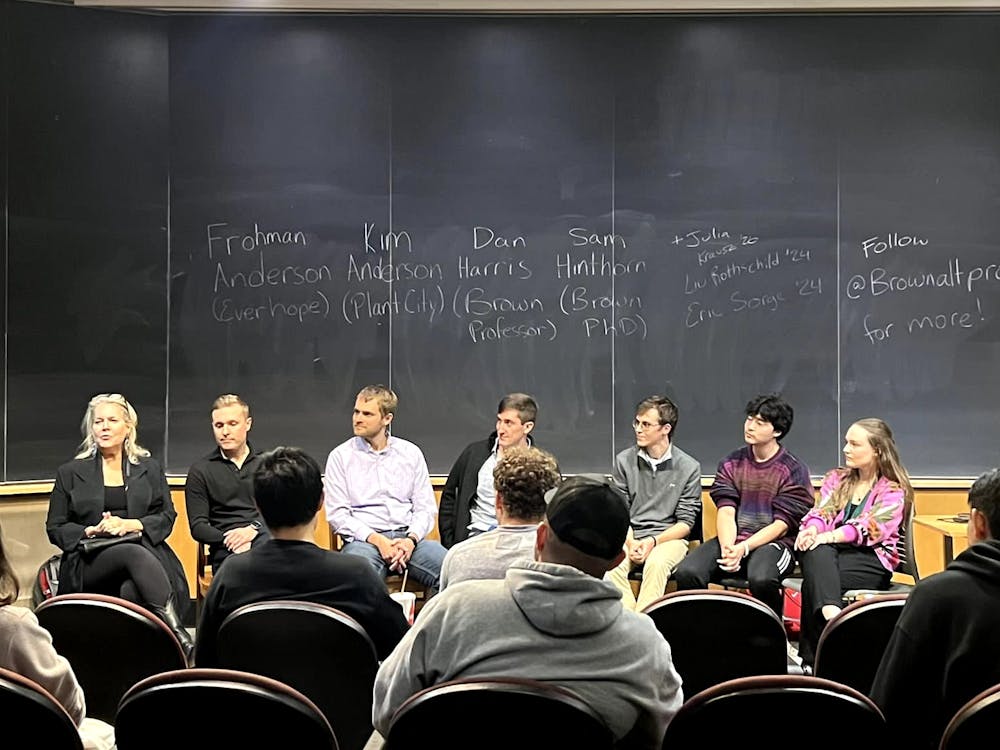On the heels of the hottest September on record, members of the University community are thinking about emission reductions on many fronts: decarbonization of the energy sector, environmental justice and — in one corner of campus — protein.
When Eric Sorge ’24 was involved with Brown Effective Altruism, he met representatives from the Good Food Institute, a nonprofit organization that advocates for vegan alternatives to animal products and aims to accelerate alternative protein innovation. Among these products are plant-based meat, cultivated meat and fermented foods, which will “ultimately feed more people with fewer resources,” according to the organization’s website.
Cultivated meat, which received increased public attention this year after the U.S. Department of Agriculture approved lab-grown chicken for sale in June, is produced when animal cells are grown in bioreactors that mimic cells being fed inside an animal’s body. This means that alternative meat can be cultivated in just two to eight weeks and could reduce agriculture-related pollution.
Working with GFI, Eric Sorge ’24 co-founded the Brown Alt Protein Project in 2021 to spread awareness about the inefficiencies of traditional food systems and the ways they can be improved.
“Our main goal with the Alt Protein Project was to foster these conversations and show that the alternative to eating conventional animal agriculture doesn’t just have to be the plant-based diet that everyone thinks it is,” Sorge told the Herald.
At a Sept. 28 panel hosted by Brown Alt Protein Project, entrepreneurs and researchers exploring the future of protein discussed the alternative protein scene on College Hill.
At the event, Assistant Professor of Engineering Daniel Harris, a researcher in fluid mechanics and alternative proteins, said that he entered the field of alternative protein largely from an animal welfare perspective. He posed a question to the audience: “How can we reduce animal suffering by doing an individual action today?”
Harris, who said he was the only professor exploring alternative proteins at Brown, has received grants from GFI for his research. Like Sorge, he was initially introduced to the company through Brown Effective Altruism.
Frohman Anderson, another member of the panel, first gained experience in the alternative protein space as a venture capitalist working with companies “coming up with technological, (plant-based) solutions.”
Anderson emphasized the importance of presenting more sustainable protein products that do not just serve as alternatives but are more compelling than the protein products people have grown up with — including chicken nuggets and hamburgers.
Panelists noted that, beyond environmental benefits, alternative proteins also serve to improve human health, as new protein creation is using recent advances in machine learning to understand how cells work, said Samuel Hinthorn GS, a PhD candidate at the Brown Center for Computational Molecular Biology.
“We can learn from one domain and transfer it over to another,” Hinthorn explained.
At Brown, Sorge said meatless Mondays would be a good way to incorporate more alternative proteins into student diets He added that the Project has future goals of possibly creating a course on alternative proteins or incorporating the topic into already existing classes.
“Changing the food system is going to take everyone,” Sorge said. “We would love to have more panels to bring together Brown community members to talk about these issues and their solutions.”
Correction: A previous version of this article incorrectly stated that Alt Protein Project pushed for meatless Mondays initiatives and that the initiatives failed because of financial concerns. The Herald regrets the error.





